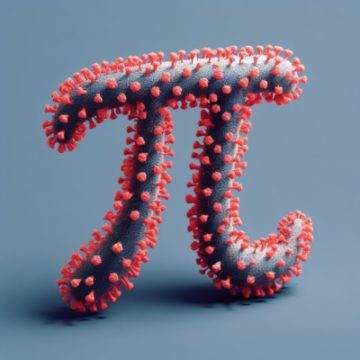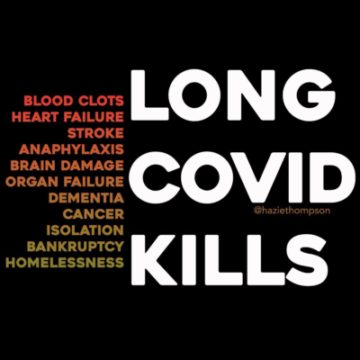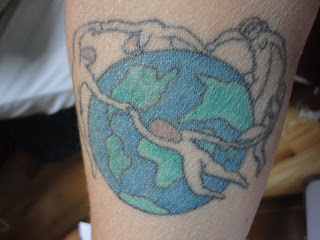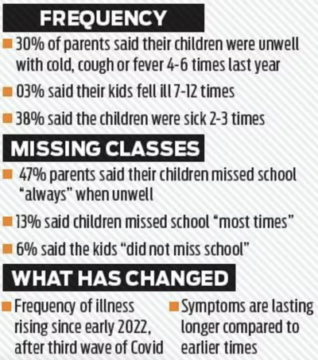As a teacher, students advertising for events often complained that nobody noticed all the posters they painstakingly put up around school. I told them it’s because there are always posters, with similar graphics, lining the hallways in the same place, so our brain has learned that attending to them won’t help us mate or eat or avoid harm. I advised hand-painted posters in new locations might help; people need something to make our brain register the posters as novel stimuli. If we didn’t acclimatize to stimuli, we’d be exhausted from noticing every single thing all day. It’s a useful mechanism until we start to forget
the danger of an invisible disease waiting for a chance to wreak havoc in our bloodstream.
The WHO is aware that the announcement of a new variant helps to get people to pay attention to Covid again. In fact they are
so aware of this that they have suppressed naming new variants of concern since November 2021. They are so wary of panic causing an economic crash or maybe violence in the streets, or
something, that they’d rather people get sick than know the truth. The fact that they name variants from the Greek alphabet clarifies that they didn’t expect so much mutation to happen so quickly. There are only
nine options left!

Some volunteers, like evolutionary biologist
T. Ryan Gregory, have taken it upon themselves to assign nicknames outside the canon in order to make it easier to discuss the over 1,700 variants that have developed
since Omicron. However, BA.2.86 (
nicknamed Pirola) is so prevalent, in over 24 countries, and spreading so fast, and is so different from the original BA.1 strain that
some think it
must be name-worthy!
“A new genetic background competing with the circulating diversity, this is something of concern. The range of its impacts is wide. . . . It’s a variant of concern. Health systems should be alerted to the possibility.”
That being said, despite the WHO’s concerns with bringing attention to officially designated variants, I don’t think a new name will be enough. I think an inner narrative may be more of a motivator to act.
Purposeful Narratives
I need a lot to have the impetus for doing a deep-clean of my kitchen. The action requires a catalyst – sometimes the first warm day of spring does it, but I missed that thrust option this year. Luckily one of my kids is moving out which will generate a good two days of cleaning after dirty shoes go in and out of every room collecting boxes and searching for that one book of theirs.
There are a few people out there that keep their homes immaculate all the time. They don’t need an external trigger or stimuli to provoke routine behaviour. And people like me openly admire them while possibly secretly deciding that surely something must be horribly wrong with them for being so obsessed with cleanliness in order to assuage our feelings of inadequacy because we know there’s a layer of sticky dust on top of our fridge right this minute. Right?
Despite being slovenly, somehow I ended up in that uber-motivated group when it comes to avoiding Covid.
I think it’s the case that people with clean homes have little messages in their head from childhood about someone possibly popping by and what they might think of them if the house were a mess. I have no such messages. My mother always said she didn’t want the epitaph on her tombstone to read: “She kept a clean house.” And it didn’t.
But Covid precautions stick for me because the virus attached itself to two of my biggest fears. Very early on, before vaccines took the edge off of acute infections, I happened to catch a video of a woman who had recovered from Covid explaining what it was like. She had been in the hospital for weeks struggling to breath without family allowed in to see her, instead surrounded by people who were similarly dying or already dead waiting to be moved to freezer vans outside. She described in detail the horror show of having lungs so full of fluid that she was literally fighting to take each breath. For some reason, she turned a corner that didn’t budge for many others; she lived to tell the tale. That story has since been augmented with all the many stories I’ve heard of people living with Long Covid, spending their life savings on babysitters when they can no longer afford actual medical care because they need help to be fed and to go to the bathroom 24/7. My second biggest fear is my children spending the prime years of their lives burdened with taking care of me.
Admittedly, these are not all-encompassing do-gooder narratives about protecting anyone near me. They’re about saving myself from pain and my children from a difficult life. Survival of the self and kin is more immediately motivating than concern with the entire species. That’s too big to consider much less affect.
So my amygdala keeps sending out alerts whenever I walk near someone unmasked. My brain yells at me:
“It takes less than 20 seconds to get Covid from an infected person. You can’t tell who’s infected because almost 60% of transmission is from people who feel perfectly healthy. Your kids might have to take care of you for the rest of their lives, and then you could drown in your own fluids!”
It’s like getting in a car and being stunned by people not wearing a seatbelt because of that one very vivid image from driver’s ed of a guy thrown through the windshield and buried head first into the asphalt of the highway in a fatal collision. An image stark enough and connected enough to our current deepest fears is all it takes to keep the adrenaline primed when it encounters a trigger. People who only buckle up when they think a cop might catch them either didn’t see that image, likely deemed too gruesome for modern day driver’s ed lessons, or it was just funny to them since they’re too desensitized from all the other gruesome things they see online.
There was an ad on TV when I was a teen: a guy had survived a car crash, and all his buddies came to see him in the hospital to find he was paralyzed from the waist down. Gradually, they stopped visiting, and then his girlfriend stopped, and then he was left just with his sobbing mother. Being disabled can be very lonely. And that video was enough to make us a bit more careful about spending the night rather than driving home drunk. Many of us have been well conditioned to have a healthy fear of cars.
We totally dropped the ball on conditioning people to be wary of Covid.
I’m not sure people can learn new stories at this point in order to change their choices. Nothing seems to work to override my mom’s voice in my head ensuring a lackadaisical attitude towards housekeeping. At the bare minimum, trying to convince others to protect themselves from Covid at least helps me reinforce it for myself.
Knowing this will likely be an ongoing, lifelong issue, maybe it’s time for another tattoo, this time borrowing from Botticelli:
I don’t know what to tell you
other than that we
must try
to take care of each other
and though I know
that you aren’t listening
I’ll keep repeating it anyways
if for no other reason
than to ensure
that I do not forget.

 Barring that reality, and knowing this would be an ongoing, lifelong issue, I got a tattoo on my Visa-paying forearm to remind myself that my actions affect the entire world. I borrowed Matisse’s Dance and have the characters circling a re-forming pangea. We need to come together on this, collectively, to reduce ongoing suffering.
Barring that reality, and knowing this would be an ongoing, lifelong issue, I got a tattoo on my Visa-paying forearm to remind myself that my actions affect the entire world. I borrowed Matisse’s Dance and have the characters circling a re-forming pangea. We need to come together on this, collectively, to reduce ongoing suffering.
 Some volunteers, like evolutionary biologist T. Ryan Gregory, have taken it upon themselves to assign nicknames outside the canon in order to make it easier to discuss the over 1,700 variants that have developed since Omicron. However, BA.2.86 (nicknamed Pirola) is so prevalent, in over 24 countries, and spreading so fast, and is so different from the original BA.1 strain that some think it must be name-worthy!
Some volunteers, like evolutionary biologist T. Ryan Gregory, have taken it upon themselves to assign nicknames outside the canon in order to make it easier to discuss the over 1,700 variants that have developed since Omicron. However, BA.2.86 (nicknamed Pirola) is so prevalent, in over 24 countries, and spreading so fast, and is so different from the original BA.1 strain that some think it must be name-worthy!
